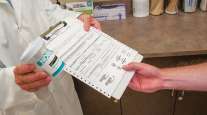Senior Reporter
Federal Regulators Modify Some Drug Testing Requirements

[Stay on top of transportation news: Get TTNews in your inbox.]
The U.S. Department of Health and Human Services has reaffirmed, and in some cases tweaked, the agency’s oral fluid and urine drug testing requirements for federal safety-sensitive government employees, including truck drivers.
In a pair of pre-published posts, totaling more than 300 pages, the agency guidance covered areas that ranged from what constitutes a refusal to take a drug test to the requirements laboratories must meet to conduct the outcome of a drug test.
Although urine testing for many years has been the only official method permitted for drug testing, the Department of Transportation proposed a plan in February to adopt HHS drug testing guidelines first approved in late 2019 that would permit truck drivers to be tested using oral fluid samples as an alternative to urine testing.
Drug Alcohol Testing by Transport Topics
“This will give employers a choice that will help combat employee cheating on urine drug tests and provide a more economical, less intrusive means of achieving the safety goals of the program,” DOT said Feb. 25 in the Federal Register announcement. “Unlike directly observed urine collections, an oral fluid collection is much less intrusive on the tested employee’s privacy.”
Public comments will be accepted through June 6.
There is no requirement for federal agencies to use oral fluid as part of their drug testing program, but now a federal agency may choose to use urine or oral fluid, or any combination of specimen types in accordance with the mandatory guidelines. Federal drug testing programs test applicants to sensitive positions, individuals involved in accidents, individuals for cause, and random testing of persons in sensitive positions.
In its proposal to adopt oral fluid testing, DOT said that when an employer determines that a post-accident or a reasonable cause-suspicion test is needed, oral fluid collections could be done at the scene of the accident or the incident. The collection could be done by any oral fluid collector qualified under federal regulations — either an external contractor or a DOT-regulated company employee, DOT said.
HHS-2022-06886 by Transport Topics
The guidance announced on April 7 by the Substance Abuse and Mental Health Services Administration, an HHS sub-agency, expressed concerns that the commercial substitution and adulteration products aimed at defeating a drug test continue to proliferate for both urine and oral fluid.
Other guidance changes or clarifications related to the drug testing included:
- The department revised a regulation to include a donor’s refusal to wash their hands when directed to do so by the collector as an example of a refusal to test by failing to cooperate with the testing process, but did not include as a refusal a donor declining to empty his or her pockets when instructed by the sample collector.
- Concluded that research shows ingestion of prepared poppy seed food products will likely not cause a positive drug test.
- Concluded that planned timely changes to drug testing panels will result in a healthier and more productive workforce, as well as avoid the issues associated with addiction and rehabilitation.
- If donor is unable to provide an oral fluid specimen, the donor will be permitted to provide a urine sample.
- A collector will report a refusal to test for any donor who fails to appear in a reasonable time or who leaves the collection site before the collection is complete, regardless of the reason for the test.
- A regulatory change says that a physician’s authorization or medical recommendation for a Schedule I substance is not an acceptable medical explanation for a positive drug test.
- Passive exposure to marijuana smoke and ingestion of food products containing marijuana are not acceptable medical explanations for a positive marijuana test result.
Want more news? Listen to today's daily briefing below or go here for more info:




